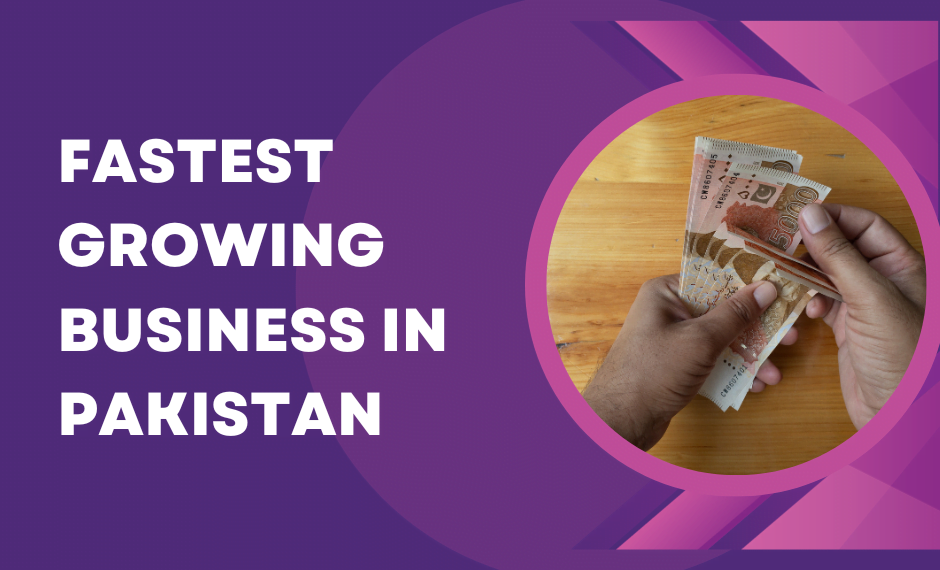
Fastest Growing Business In Pakistan
Pakistan, a country with a rich history and a dissimilar culture, has been progressively continuing in its economic growth over the past few years. With a population of over 220 million people, it offers a massive market potential for numerous industries. In this blog post, we will research the fastest-rising business sectors in Pakistan, emphasizing the key influences on their development and the occasions they propose to businesspersons and investors.
The fastest business in Pakistan
There is the following fastest-growing business in Pakistan, which includes:
• Information Technology and Software Development
Pakistan’s IT industry has seen unexpected development in recent years, making it one of the fastest-developing sectors in the country. The obtainability of a young, tech-savvy staff, combined with government inducements and a rising demand for IT services both nationally and globally, has powered this growth.
Numerous Pakistani IT companies have made a name for themselves on the global platform, providing facilities such as software development, mobile app development, and IT subcontracting. The country’s IT distribution has shown important development, appealing to foreign reserves and creating service opportunities for thousands of IT professionals.
• E-commerce
E-commerce has transformed the way Pakistanis shop, with progressively more people revolving to online display places for their buying requirements. Issues like augmented internet diffusion, digital expense systems, and the suitability of online shopping have contributed to the quick growth of e-commerce businesses in Pakistan.
Markets like Daraz, Telemart, and Yayvo, along with numerous niche online shops, have established a strong online presence. The quicker the development of e-commerce, the more people prefer to shop from the comfort of their homes.

• Agriculture Technology
Agriculture is a significant segment of Pakistan’s economy, and new advancements in AgTech have been essential in refining agricultural performance. Farmers are now accepting advanced skills for yield monitoring, soil examination, and irrigation management.
Startups concentrating on AgTech are developing, given that answers like digital agriculture stages, drones for harvest intensive care, and data-driven choice provision systems. These inventions not only increase agricultural output but also decrease expenditure and guarantee food security.
• Renewable Energy
Pakistan is portrayed as an energy disaster, and the government has been enthusiastically approving of renewable determination consequences to address this issue. Solar and wind energy schemes have gained noteworthy attention in recent years, with numerous important schemes in operation.
The China-Pakistan Economic Corridor (CPEC) has engaged in recreation, which plays a vital role in enabling assets in the renewable energy substructure. These savings have not only assisted in overwhelming energy deficiencies but also condensed the country’s requirement for fossil fuels, subsidizing a domestic and more maintainable environment.
• Health and Wellness
The health and wellness segment in Pakistan has experienced extraordinary development as people become more health-aware. This development is obvious in numerous sub-sectors, containing medicines, fitness, and organic food production.
The pharmaceutical industry, in particular, has expanded rapidly, with several local companies creating good general medicines and spreading them to international markets. Moreover, suitability manufacturing has seen a flow in gyms, fitness centers, and wellness hospitals, catering to the growing demand for healthier lifestyles.
• Real estate and construction
Development and resident progress in Pakistan have been controlled by an important request for housing and substructure growth. Real estate and building have, consequently, appeared as key drivers of financial growth.
The building industry has seen substantial investments, particularly in the wake of the government’s Naya Pakistan Housing Program, which aims to deliver reasonable housing to low- and middle-income citizens. Moreover, the development of new commercial projects, shopping malls, and housing societies has shaped profitable chances for investors and developers.
• Food and Beverage
The food and drink industry in Pakistan has changed meaningfully, with a rising middle class and altering consumer preferences. Fast-food chains, global restaurant permits, and local food startups have exploited this tendency.
The introduction of distribution apps and the appearance of cloud kitchens have increased the food industry. Businesspersons are investigating exclusive perceptions, fusion cookeries, and a health-conscious set of choices to provide to a varied customer base.

• Textiles and Garments
Pakistan has an established custom of textile and garment industry, which is one of the country’s main industries. In spite of facing global struggle, Pakistani textile manufacturers endure to revolutionize and invest in modern technology to stay modest.
The textile and garments segment has extended into value-added products like denim, sportswear, and home textiles. The segment also benefits from special trade arrangements with numerous countries, making it a good-looking choice for foreign buyers and investors.
• Tourism
Pakistan’s wonderful natural beauty, historical sites, and varied cultures have happened to entice more tourists in recent years. The government’s struggles to endorse tourism over initiatives like the ‘Visit Pakistan’ campaign have played an important part in this growth.
Tourism-connected businesses, including hotels, tour operators, and transportation services, are flourishing. Adventure tourism, in particular, has increased admiration amongst both domestic and global travellers, offering occasions for entrepreneurs in the warmth and adventure sports sectors.
Challenges And Opportunities
Though this business sector offers huge potential for growth and asset value, there are also encounters that need to be addressed. These tasks comprise administrative obstacles, substructure limits, and security concerns. Though the government is taking steps to generate a more business-friendly situation by refining the comfort of doing business, guaranteeing security, and capitalizing on infrastructure.
Conclusion
Pakistan is on the pathway to becoming a vivacious and lively economy with many chances across various business sectors. The fastest-growing industries, including IT, e-commerce, AgTech, renewable energy, fitness, and real estate, imitate the nation’s possible economic wealth. Businesspersons and investors keen on exploiting these chances should carefully measure the market, become familiar with changing tendencies, and influence government inducements to ensure maintainable development and achievement in Pakistan’s evolving business landscape.
